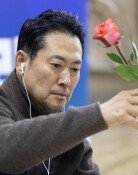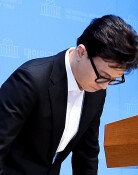Master-servant relationship in sexual harassment
Master-servant relationship in sexual harassment
Posted May. 18, 2013 08:15,
The entire nation was reeling of the Yoon Chang-jung sex scandal throughout this past week. Sexual harassment committed by an aide who accompanied the president to a visit to the U.S., and his sudden return is an episode of dirty drama, which was performed by leadership of this nation. At a time when Yoon should have been already busy with handling tasks to support the president, but he grabbed the buttocks of a Korean American female intern, and called her in to his room, completely naked, which are acts that are insane at best.
People are struggling to grapple with severe mental agony. It was none other than Yoon himself who made the case from bad to worse. The press conference that he voluntarily offered graphically demonstrated what would constitute the most shameless act that one can take. Initially, people wanted to believe when he claimed, I only tapped her waist, giving words of encouragement. I gave her my room key to ease her inconvenience, but she dropped by early in the morning, and I reprimanded her and sent her out. People thought that after all he was a spokesman for the president of the nation, and that it would be impossible for him to sexually abuse a young college student if he had sanity. However it took no time before he had a free fall into abyss. As what he testified at a probe by the presidential office and signed was made public, and news gathering and reporting by reporters completely revealed, all his shameless lies were brought to light.
His lies were thoroughly premeditated. Unlike the victims claim that Yoon grabbed buttocks, he strongly emphasized waist. It would be fair to believe that he intentionally made the remarks by taking into consideration the criteria to determine sexual crimes under the U.S. Federal law. He emphasized waist in order to avoid punishment, because the U.S. law defines as sexual contact the act of touching the genital, breast, or buttocks either directly or over the clothes. Because he vowed under his own name and dignity that he was not the kind of person who would commit sexual assault, he is now facing a situation where he have no choice but to accept any criticism even for his own testimonies, in which he admitted that he had touched the interns hip and had been completely naked in his hotel room.
It would hardly be forgivable even if he made deep apologies. But he prepared how to cope with the situation by getting legal advice, before voluntarily offering a press conference in an attempt to make the incident merely an episode that occurred due to cultural differences, and thus blaming the female intern, which is truly lamentable. Moreover, the fact that he sought to make the student a weird person, who visited his hotel room even though he had not called her in, makes this writer as a woman to feel truly despicable, as it effectively creates a situation where a victim suffers from secondary damage in the course of trials on sexual crime.
Sexual assaults and harassments of this kind more often occur in relationship between male superior and female subordinate. Sexual harassment and sexual assaults at workplaces are incidents that have been revealed in the scope of sex crimes arising from the master-servant relationship in business, an issue that was highly controversial lately in Korea. Reporting the Yoon scandal, The New York Times said that Korean culture wherein male superiors trivially harass female staff at the excuse of intoxication at workplaces is also partly responsible for the incident, which was shame on all Koreans.
After all, the Yoon scandal also occurred due to the inferior status of the female intern, who could not afford to decline an offer by Yoon, a superior, to have drinks together. Moreover, her patriotism and sense of responsibility that prompted her to volunteer to support the president of her motherland, and trust in Yoon that someone like a presidential spokesman would not make a mistake, enabled her to have drinks until late at night. When Yoon asked her to come to his hotel room, she initially declined, but when Yoon maximized despotic behaviors as superior by using abusive language, she would have faced a situation where she could hardly afford to reject. The New York Times report, which raised issue with this, is surprising in that it alarmingly accurately hit the mark of superior-subordinate relationship in Korean society.
Of course, the superiors position should be taken into consideration as well. The standard by which to determine whether sexual harassment can be construed as having occurred, as set by Koreas Supreme Court, is arbitrary to a certain extent. When defining sexual harassment at workplace, Article 2 of the Act on Equal Employment of Men and Women, and Article 2 of the acts executive ordinance give top consideration to the victims subjective situation. The Supreme Court also makes judgment based on whether the victim herself felt sexually humiliated or sense of repulsion. Since these rules fail to take into consideration the offenders intention, if the offender is a highly attractive superior, whether such an act would constitute a crime could change just because the victim does not feel sense of repulsion due to his attractiveness. Nonetheless, in whatever situations, tyrannical behaviors and abuse of superior stature by the superior in master-servant relationship should be root out. Just as in trade relationship between companies, the subordinate cannot afford to accept unjust demand made by the superior in the arena of sex crimes as well. However, at the pretext of preventing abuse and exploitative behaviors by the superior, such practice should not be used as tool to distort even the process of free and voluntary decision-making by and between the concerned parties. If the issue of master-servant relationship is exploited as rational for only emphasizing social equity, it should be refrained from as well.






![[김순덕의 도발] ‘李부터 연임’ 개헌, 이 대통령은 가능성을 말했다](https://dimg.donga.com/c/138/175/90/1/wps/NEWS/IMAGE/2026/01/16/133172656.1.jpg)
